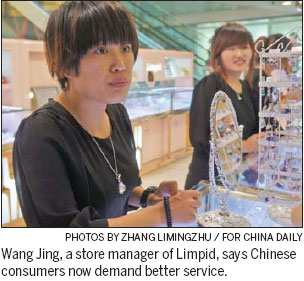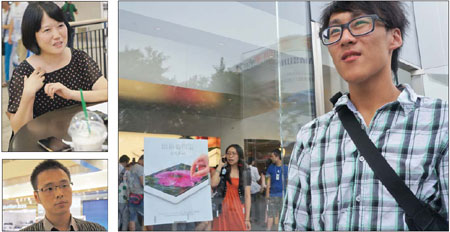Different strokes for different shoppers

| Clockwise from top left: Li Jianjun, a photography lecturer at Zhongzhou University in Henan province; Yu Runze, a high school graduate in Beijing and a fan of Apple products; and Wu Hansen, an auditor with Ernst & Young. |

Yu Runze is not only a fan of Apple products but wants to work for the company when he graduates in computer science from college.
The 19-year-old high school graduate is typical of many of China's young new consumers.
He was one of hundreds of shoppers crammed into the Apple store at the Joy City shopping mall in Xidan in Beijing.
"I just came to the store to learn more about the new MacBook Pro. I like the design of Apple products," he says.
"I am going to study software and computer science at college and it doesn't matter what I do afterwards so long as I can work for Apple."
European retailers such as Greek-owned fashion accessories brand Folli Follie was also attracting shoppers at its world flagship store in Oriental Plaza in Wangfujing, which opened in June. It sells simple rings from 500 yuan ($79, 63 euros) to 18,000 yuan necklaces and now has more than 100 stores in China.
Zhao Xiaoman, 34, the store's manager, says her main customers are independent professional women between 20 and 40.
"We have a lot of wealthy (Chinese) tourists from second and third-tier cities who have never heard of our brand but like the products and just buy them. Money doesn't matter to them," she says.
"The Western consumers we have here tend to be less spontaneous."
It is often glamour images from the West that influence the purchases of some consumers.
Tian Yanan, 20, a music student at the China Conservatory in Beijing and who is from Qufu in Shandong province, says she is more likely to buy a product if it is advertised using Western rather than Chinese models.
"I prefer to see a foreign model on a billboard. It gives me the impression the brand is international and has quality," she says.
Li Yue, 24, a student from Heilongjiang province who is about to start for a master's degree in Beijing, says her shopping habits are completely different to those of her parents.
"My parents are about 50. My father never shops and my mother only buys Chinese clothes brands like JNBY, Broadcast and Girdear," she says.
"I like Western brands such as H&M, Zara, C&A and Vero Moda, but I have to consider the price when I buy them because Chinese goods are cheaper."
Someone not so influenced by foreign brands is Wu Hansen, 26, from Fujian province and now an auditor with Ernst & Young in Beijing.
"I don't really care about the brands surrounding me. People want to buy high-profile brands to show how rich they are, especially when the products are English," he says.
"I tend to buy them only for parents as a way of telling them I have a good life and career in Beijing."
Linda Li, 21, an information technology student at Shanghai University of Electric Power, says some people go over the top with spending.
"I have a friend who is 20 and she is just brand crazy but buys things which are too mature for her and out of line with her status. They just make her look weird," she says.
Lu Ling, 41, who works for a State-owned company in Liaoning province, says living standards have improved but says she used to spend proportionately more on clothes 20 years ago than now.
"Then I would spend 80 to 100 yuan on dresses when my salary was 300 to 400 yuan a month. Now I spend between 1,000 and 2,000 yuan on them while earning less than 10,000 yuan a month. What you can buy, however, has radically changed," she says.
Li Jianjun, 47, a photography lecturer at Zhongzhou University in Henan, used to make her own clothes but says she wouldn't get away with it now.
"I still have emotional ties to self-made clothes but people expect you to wear better these days. My friends read all the fashion magazines and are very brand conscious," she says.
" I like Burberry and I have bought discounted Chanel dresses. For an important occasion I might buy a 3,000-yuan bag," she says.
Li, who lives in Beijing, says she prefers Chinese cosmetics brands to Western ones.
"I still buy the Shanghai-based facial cream brand Youyi and Pechoin. My mother likes these old brands and I also use them," she adds.
Wang Jing, 28, store manager for Limpid, the Hong Kong jeweler, in the Joy City shopping mall, says Chinese consumers now demand better service.
Her customers tend to range from 28 to 45 buying earrings from 98 yuan to amber bracelets at 20,000 yuan.
"What consumers want is the whole shopping experience and after-sales service like cleaning, repairing and replacing new for old. I think this is where we compete well against Western brands," she says.
For many young consumers it is still the Apple store that is a draw.
Lilly Yang, 29, an English teacher from Anshan in Liaoning province, was researching the New iPad at the Joy City store.
"I don't know why Chinese are so crazy about Apple and make the store a sort of tourist attraction," she says.
Yang's student cousin He Fang, 19, who was shopping with her, says she wouldn't even care if Apple products were three times the price.
"I would still buy them. My friends and everyone I know have iPads. It is a kind of social tool and a way of being accepted in any circle," she says.
For Li, the photography lecturer, it is difficult to say whether China's new consumerism benefits society.
"You can't simply say whether it is healthy or unhealthy. Many of international brands the Chinese are buying have factories in China so it fuels the economy. I am not sure, however, whether it helps our cultural development," she says.
Deng Zhangyu contributed to this story.
andrewmoody@chinadaily.com.cn
(China Daily 08/10/2012 page5)
Today's Top News
- Xi calls for promoting volunteer spirit to serve national rejuvenation
- Xi chairs CPC meeting to review report on central discipline inspection
- Reunification will only make Taiwan better
- Outline of Xi's thought on strengthening military published
- Targeted action plan to unleash consumption momentum
- Separatist plans of Lai slammed































